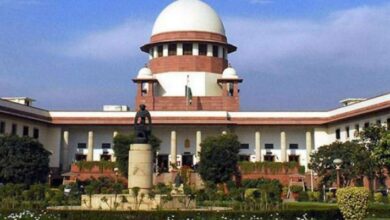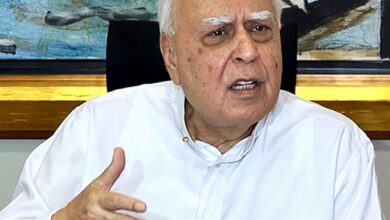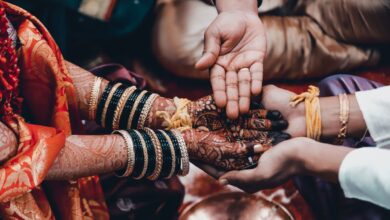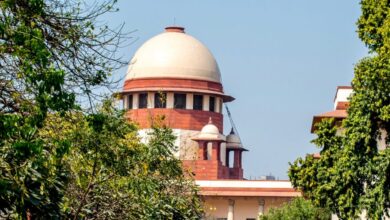Madras HC Limits Non-Hindus’ Access To Temples, says “Temples Not A Picnic Spot”
The Madras court ordered the respondents to erect signs saying that "non-Hindus are not allowed inside temple after Kodimaram"
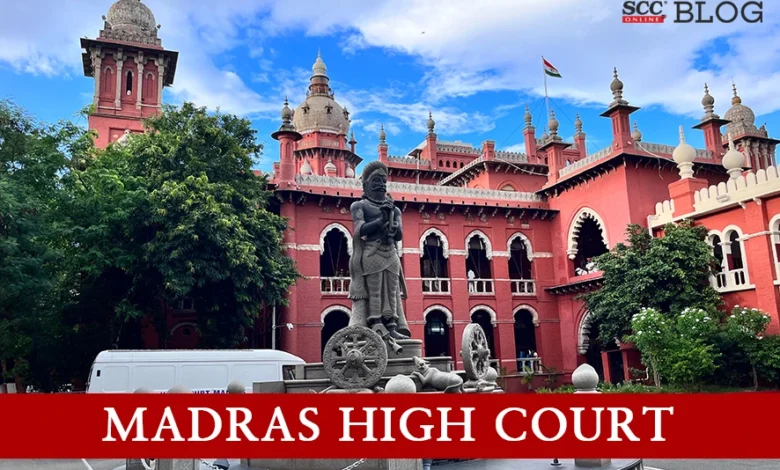
The Madras High Court ordered the Tamil Nadu HR&CE department to put up signs at all Hindu temples on Tuesday, declaring that Hindus have the basic freedom to profess and practise their religion and that non-Hindus are not allowed to enter the shrines beyond the “Kodimaram” (flagpole) region.
Justice S Srimathy of the HC’s Madurai Bench rendered the decision after hearing a petition from D Senthilkumar, who requested that the respondents only allow Hindus to visit the Arulmigu Palani Dhandayuthapani Swamy temple and its sub-temples. Additionally, he requested that display boards to that effect be erected at each entry.
The Dindigul district’s Palani is home to the well-known Lord Murugan temple. The Tamil Nadu government, represented by the Executive Officer of the Palani temple, the Commissioner of the Hindu Religious and Charitable Endowments Department (HR&CE), and the Principal Secretary of the Department of Tourism, Culture, and Religious Endowments, were the respondents.
Tamil Nadu’s Hindu temples are managed by the HR&CE department. After accepting the petition, the court ordered the respondents to erect signs saying that “non-Hindus are not allowed inside temple after Kodimaram” at the shrine’s main entrance, next to the flagpole, and in other prominent locations.
“The respondents have been instructed not to permit non-Hindus who do not adhere to the Hindu faith. The court decided that if a non-Hindu person claims to have visited a particular deity in the temple, the respondents must get an assurance from the non-Hindu person stating that he has faith in the deity and will adhere to Hindu customs and practices. Only then can the non-Hindu person be permitted to visit the temple,” the court declared.
Additionally, if such a person is permitted based on the endeavor, it will be noted in the record that the temple will keep.
“The respondents shall maintain the temple premises by strictly following the agamas (temple rules), customs and practices of the temple,” ruled the court.
The defendants stated that the ruling might only apply to the Palani temple, for which the aforementioned writ suit was alone filed.
“But the issue raised is larger issue and the same ought to be applicable to all Hindu temples, hence the plea of the respondents is rejected. As stated supra these restrictions would ensure communal harmony among different religions and ensure peace in the society. Therefore the State Government, the HR&CE department, the respondents and all persons who are involved in temple administration are directed to follow the directions to all Hindu temples,” the court stated.
Hindus have the freedom to openly declare and uphold their religion
Hindus have the freedom to publicly profess and follow their religion. “Likewise, people belonging to other religions have right to profess and practice their religion. But the customs and practice of their respective religion cannot be interfering with and any interference ought to be curtailed. The temple is not (a) picnic spot or tourist spot. Even in Arulmighu Brahadeeswarar Temple, Thanjavur the other religion people are allowed to admire and appreciate the architectural monuments of the temple, but not after Kodimaram.”
“While admiring the architectural monuments the people cannot use the premises as picnic spot or tourist spot and the temples premises ought to be maintained with reverence and as per agamas. Therefore, the rights guaranteed under the Articles is not granting any right to the respondents to allow the other religion people if they do not have any faith and belief in the Hindu religion. Moreover, the rights are guaranteed to all religions and there cannot be any bias in applying such right,” the court declared.
The High Court also brought up a few reported instances of non-Hindus visiting temples.
“It was also reported that in Arulmighu Brahadeeswarar Temple a group of persons belonging to other religion had treated the temple premises as picnic spot and had non vegetarian food inside the temple premises. Likewise, recently on 11.01.2024 a newspaper had reported that a group of persons belonging to the other religion had entered the Arulmighu Meenakshi Sundareswarar Temple, Madurai with “their sacred book” near sanctum and sanctorum and was attempting to do their prayers” there.
According to the judge, these incidents are in violation of the fundamental rights guaranteed to Hindus under the Constitution.
“The Hindus also have fundamental right to profess and practice their religion freely and propagate their religion without interfering in their way of practice. Therefore, the Hindus have right to maintain their temples as per their customs, practices and Hindu Religious and Charitable Endowment Department is having duty to protect the temples from such unwanted incidents.” “In fact, in the above narrated incidents the Department had failed to protect the fundamental rights guaranteed under the constitution,” the court concluded.
You might also be interested in-Fishermen oppose Billionaire Adani’s mega port expansion in Tamil Nadu
